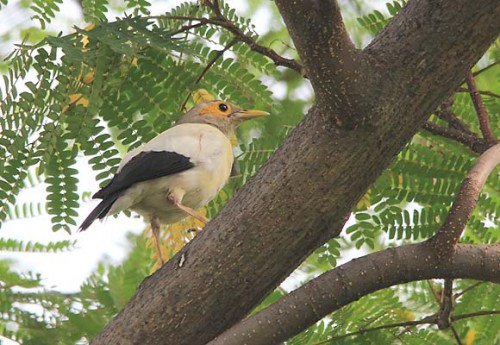Courtesy of TRAFFIC

Black-winged mynas are now so valuable that a captive breeding centre, where birds were being reared for conservation purposes, suffered a double robbery in June 2014, and almost the entire breeding stock, more than 150 birds were stolen. Photo courtesy of TRAFFIC.
Black-winged Mynas are prized in the cage bird trade for their striking black and white plumage, lively behaviour and singing ability. Unfortunately, their extreme rarity in the wild adds to their desirability.
The species is native only to the islands of Java and Bali and is protected under Indonesian law. Despite this, illegal capture in the wild continues, while trade is carried out openly in Indonesia’s notorious bird markets. Just a few hundred individuals of this once common bird remain in the wild. The Black-winged Myna is currently assessed as Critically Endangered by IUCN.
The birds are now so valuable that a captive breeding centre, where birds were being reared for conservation purposes, suffered a double robbery in June 2014, and almost the entire breeding stock, more than 150 birds were stolen.
Surveys by TRAFFIC and Oxford Brookes University researchers between 2010 and 2014 found significantly fewer Black-winged Mynas available in the three largest bird markets in Indonesia’s capital, Jakarta: down by three-quarters since the 1990s. This coincides with a more than ten-fold increase in asking prices and the near complete decimation of the species in the wild.
While the bulk of trade in Black-winged Mynas appears to supply domestic demand, there is also an unknown level of international trade.
The authors of the latest study, published in Bird Conservation International, recommend that Indonesia lists the species in Appendix III of the Convention on International Trade in Endangered Species of Wild Fauna and Flora (CITES).
“An Appendix III-listing is essentially a call for support by a country to assess the international trade in a species. That information would be essential for devising an action plan to save the species”, explained Vincent Nijman, Professor at Oxford Brookes University.
The open and widespread illegal trade in birds in Indonesia is pushing these Mynas and many other species down a dangerous path. The demise of the Black-winged Myna is an eerie reminder of the fate of its close relative, the Bali Myna. The two are similar in appearance, and indeed the trade in Black-winged Mynas partly arose as a replacement species for the increasingly rare and expensive Bali Myna.
“TRAFFIC is extremely concerned over the increasing threat of extinction from trade to the Black-winged Myna”, said Dr Chris Shepherd, Regional Director of TRAFFIC in Southeast Asia. “Indonesian authorities should demonstrate willingness to uphold their own national wildlife laws. It is high time for uncompromising and swift action against the illegal trade in the notorious bird markets.”
Commercial captive breeding is unlikely to remove pressure from remaining wild populations of Black-winged Mynas as long as enforcement efforts to prohibit the poaching and trade of the birds are absent or inefficient.
Illegal trade pushing the Critically Endangered Black-winged Myna Acridotheres melanopterus towards imminent extinction (PDF, 218 KB) by Chris R. Shepherd, Vincent Nijman, Kanitha Krishnasamy, James A. Eaton and Serene C. L. Chng is published in the journal Bird Conservation International.
The crisis facing the Black-winged Myna and other Asian songbirds is scheduled to come under expert scrutiny next month at the inaugural Asian Songbird Crisis Summit, taking place on 26-29th September 2015 in Singapore.

![Indonesia: Pangolin Smugglers Doing Their Dirty Work [Photos]](https://annamiticus.com/wp-content/uploads/2013/10/PangolinsArrive-150x150.jpg)


